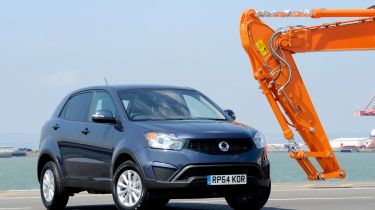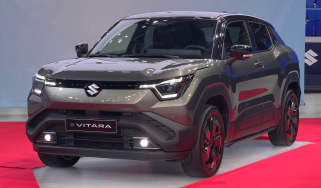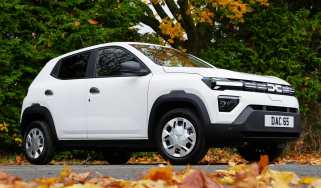SsangYong Korando van (2015-2016) review
The SsangYong Korando CS is a small SUV-based van with limited load space, but CSX version has some off-road ability
The SsangYong Korando is a compact SUV operating at the more affordable end of the car market. It’s not only a car though, the SsangYong Korando CS and CSX models are commercial vehicle versions of the passenger car - with a load area where the rear seats used to be.
The conversion to van form has left the Korando’s rear doors in place and these provide access to the 1.3m3 load area in addition to the tailgate at the rear. The rear windows are panelled over inside to prevent damage from cargo but the exterior glass is retained so from the outside the Korando van still looks like an SUV to the untrained eye.
• Best pick-up trucks to buy now
The Korando CS is the front-wheel-drive version, while the CSX adds a torque-on-demand 4x4 system that sends drive to the rear wheels when things get slippy. Both models use the same 147bhp 2.0-litre diesel engine and come with a rather notchy 6-speed manual gearbox as standard.
The Korando passenger car doesn’t compare all that favourably with the best exponents in the compact 4x4 class but the choice for buyers seeking a small, off-road capable commercial vehicle is far more limited.
More reviews
In-depth reviews
Now the Mitsubishi ASX 4Work van has slipped from the pricelists, the marque offers an Outlander 4Work van that’s a bit bigger and a lot more expensive than the SsangYong Korando. The Korando is closer in price and capacity to small car-derived vans like the Vauxhall Corsavan and Ford Fiesta van. In that company, its high-riding, off-roader design holds useful appeal.
MPG, CO2 and Running Costs
Fuel economy and emissions vary according to your choice of Korando CS (FWD) and Korando CSX (4WD) versions but not by as much as you might think. The combined economy figure of the CS model is a respectable but not spectacular 47.1mpg, while the 4x4 CSX returns 45.6mpg.
Average Van Insurance Costs
In association with
SsangYong Korando: from £317
These are indicative prices based on a small volume of policy holders who meet the occupation and location criteria noted with Admiral Van Insurance, your individual price may vary. Based on vehicles aged 2015 or younger and policies sold from 1.7.17 to 31.7.18.
At 1,747kg, the Korando CSX is 81kg heavier than the CS but its torque-on-demand 4x4 system only sends power to the rear wheels when traction is required - helping to keep fuel consumption in check. In terms of emissions, it’s 147g/km for the CS and 151g/km for the CSX model. Both versions fall into group 7E for insurance purposes.
Load Space and Practicality
With 1.3m3 of load space, the Korando van offers more space than a hatchback van, such as the Ford Fiesta van, but less than the smaller vans on the market, such as the Fiat Fiorino with 2.5m3.
At least the load space is more accessible than in a hatchback van, thanks to the flat loading floor set at the height of the rear loading sill. This makes it easier to slide a load into the back of the van than it would be in a hatchback van.
The rear side doors help too, meaning it's far easier to reach items at the front of the load space than it is in a hatchback van - but they are quite narrow, so loading large items is better done via the tailgate.
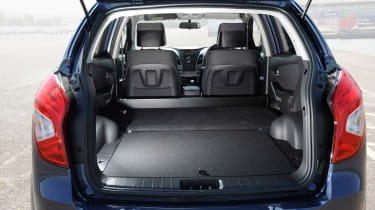
The Korando van comes without a bulkhead as standard but you do get tie-down points in the load area. A full bulkhead with a mesh upper is available from the options list.
The Korando can manage a 514kg payload in both its guises. That’s competitive with supermini-based van rivals, such as the Ford Fiesta, Fiat Punto Van and Vauxhall Corsavan, which will all carry at least 500kg.
At 1,525mm, the Korando’s load area is slightly longer than that in the Ford Fiesta van and has a bit less space between the wheel arches, which take up a fair bit of the load space in a comparatively short vehicle like the Korando.
The limited load space would be useful for carrying tools and some equipment when occasional off-road access is needed. It should be possible to fit a standard-sized hay bale into the back, too. A larger alternative would be the Peugeot Partner or Citroen Berlingo. Although both lack the four-wheel drive of the Korando, they can be specified with added ground clearance and Peugeot/Citroen’s Grip Control system, which uses the ESC controls to give an electronic alternative to a locking differential. The Citroen would carry a 661kg payload and the Partner 850kg while offering a 3.3-cubic-metre load space.
Reliability and Safety
The Korando has been around for a comparatively short time and so far does not appear to be running into reliability issues. The five-year “limitless”-mileage warranty covers the engine and drivetrain, anti-corrosion warranty, wheel bearings, suspension, steering joints, and shock absorbers.
The audio system is also covered for five years. Brake pads and clutch friction plates are covered for a year, or 12,000 miles, while the battery is covered for three years. It's a comprehensive warranty that's generally better than most light CVs.
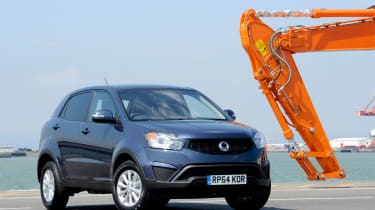
Safety equipment includes ESC electronic stability control, driver, passenger, curtain and front side airbags plus seatbelt pretensioners. HSA Hill Start Assist and ARP Active Rollover Protection are also included as part of the stability control package.
Driving and Performance
The Korando van uses SsangYong’s own e-XDi 2.0-litre diesel engine, which produces 149bhp at 3,400rpm. Performance is respectable for a small commercial vehicle with 360Nm of torque from 2,000rpm delivering decent low-end muscle.
Noise levels are low unless you push the engine hard and the controls are light, with the exception of the 6-speed manual gearbox, which is extremely notchy and cumbersome to use. The Korando rides well and feels planted on the road but there’s too much body roll through corners.
SsangYong doesn’t pretend that the Korando CSX can go anywhere that a Land Rover Defender can but it is equipped for use in wet and muddy off-road conditions. There’s an all-wheel-drive lock mode that splits torque 50/50 between the front and rear wheels at speeds of up to 25mph to help when the going gets tough.
Cab and Interior
The well-specced Korando van comes with manual air-conditioning, electric windows, steering wheel height adjustment, cruise control, heated and electrically adjustable door mirrors and remote central locking, so you get a lot for the money.
The dashboard materials don’t look up to VW standard, but the Korando is a classier proposition inside than some of SsangYong’s other efforts. Storage space may not be as effective as in a purpose-built van, but there’s a glove box, space in the centre console and door pockets to keep items in. In general, there’s more driver comfort than you would find in most 4x4 pick-ups and vans, even if the Korando can't match their off-road abilities.
Van dimensions
| Body style | Height | Width | Length |
| Korando van | 1,675mm | 1,830mm | 4,410mm |
Load area dimensions
| Body style | Height | Width | Length | Volume |
| Korando van | 900mm | 1,350mm | 1,525mm | 1.31m3 |
(Width between wheel arches: 965mm)
